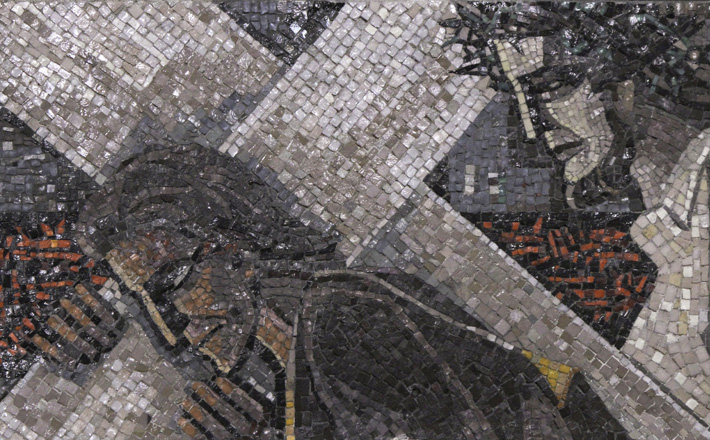Commentary on Psalm 69:7-10, [11-15], 16-18
In Psalm 69, a servant of God (69:17) suffers for no fault of his own, but rather for his devotion to God (69:9).
He is an innocent sufferer, even a righteous sufferer, and the servant claims that he suffers “for God” (69:7). For these reasons, Psalm 69 is a profound meditation on suffering comparable to the great Isaianic passages about the “servant of YHVH,” especially Isaiah 52:13 — 53:12, and that devastating book called Job. Suffering, in our psalm, is not the consequence of sin but of piety, and it is suffering that benefits God.
The reality of suffering
Psalm 69 readily admits the reality of suffering and that suffering is an undesirable experience for the righteous. The psalm does not glorify suffering as an opportunity either for education or for demonstrating the virtue of patience, even if suffering can be those things. The psalmist simply decries his suffering and petitions God for a swift deliverance:
I am in distress — make haste to answer me. (69:17b, NRSV)
In short, the psalmist does not glorify suffering but complains effusively, honestly, to God. Complaint, then, is presented as a righteousness and faithful expression of hope in God.
The cause of the suffering in the psalm also deserves note. The psalmist, from among the wide palette of painful experiences, lifts up the suffering caused by the human tongue. The psalm mentions enemies (69:4, 18), they do not approach with bow and arrow but with words – a very human approach and arguably humanity’s most potent weapon. Thus, the psalmist complains of insults, gossip, and the mocking song and describes them in the powerful, if typical, language of chaos waters:
I sink in deep mire,
Where there is no foothold;
I have come into deep waters,
And the flood sweeps over me. (69:2)
The suffering caused by human words is palpable to the body, as the rush of words suffocate the psalmist. That is why the prayer for deliverance found in the psalm is no less urgent than the prayers of psalms in which military threat is in view. Suffering caused by human words — typically of family and neighbors (69:8) — is every bit as real as that caused by the arrow and the fang. Words, even when they are false, can kill.
Innocent suffering
Also important is the observation that the psalm admits of innocent suffering. More than that, it describes the suffering of a pious, even righteous, person. The psalmist suffers, not for some uncharacteristic peccadillo — for “looking upon a virgin” or ignoring the complaint of a slave against him” (Job 31) — but because of his “zeal for [God’s] house” and for earnest fasts (69:9, 10). Was the enthusiastic piety of the psalmist an affront to the easy religiosity of his contemporaries? Whatever the perceived offense, from the perspective of the psalmist, he suffers because of righteousness. His is innocent suffering.
It is important, in this light, to note that suffering is not, within the world of the Bible, necessarily a sign of sin. This lesson, of course, is at the heart of the Book of Job. Job’s three friends, no doubt learned and respected men not unlike Job himself, interpret Job’s suffering as the fitting consequence of sin and, out of genuine concern (which admittedly turns acerbic), advise Job to agree with God’s judgment (i.e., the plain meaning of the suffering) and repent. Repentance, they propose, will cause God to turn away from his righteous anger and restore Job to blessedness.
Our psalmist entertains no such possibility. Far from repentant, he stands certain in his righteousness before God (69:5) and looks, not to repentance as the path toward restoration, but to lament and complaint. The psalmist does not obfuscate the reality of his suffering, which includes verbal bullying and social ostracism (69:8) — experiences not uncommon among youths and adults, then and now. Rather, he openly laments and complains that God, to whom he has directed his prayers, has been too slow in responding:
Do not hide your face from your servant…
Draw near to me, redeem me… (69:17a, 18a)
The psalm, then, presents lament and complaint as fitting responses of the righteous to suffering, especially when the suffering is innocent. Does the Bible claim that punishment follows sin? No doubt. But it also admits that the innocent suffer. And the prescribed response, in such cases, is lament (the full acknowledgment that suffering is evil) and complaint to God, who appears too distant and all too silent in the midst of suffering. Lament and complaint are prayer based on the hope that the Holy One can be moved.
Vicarious suffering
The Bible refuses to believe that human suffering is without meaning. And the commitment to an understanding of suffering as meaningful becomes an acute theological problem especially with innocent suffering. This is the case in our psalm, as it is in Isaiah 53. And the psalmist makes perhaps an outrageous claim for his innocent suffering: he suffers “for God” (69:7).
It is for your sake that I have borne reproach,
That shame has covered my face…
The insults of those who insult you have fallen on me. (69:7, 9b)
Psalm 69:9b identifies those who disparage the psalmist as the very persons who disparage God. The unstated claim is the identification of the psalmist with God.
The psalmist makes perhaps a grander claim in 69:7. The force of the Hebrew phrase translated “for your sake” is unclear, but possibly is an interpretation that includes a dimension of benefit. The phrase might indicate that the psalmist’s suffering benefits God; that is, the psalmist may be saying that he suffers in the place of God, for God: the insults directed to God falls instead on the psalmist so that God is spared the affront.
The suffering of which the psalm admits, then, is more than innocent suffering. It is more than even righteous suffering. It is vicarious suffering that is not only effect — caused by the psalmist’s piety — but also cause, whose effect is a benefit, in some mysterious way, to God. In short, the psalmist, in his suffering, honors God — glorifies God.
Salvation from suffering
Given the special character of the psalmist’s suffering, it is no surprise that the petition for salvation takes on elevated meaning. The psalmist argues that his deliverance from suffering signifies an affirmation of all who hope in and seek God (69:6). Why? Because the psalmist, in his suffering and salvation, stands before God and his fellow human beings as an icon of all the servants of God. The suffering servant has become the representative of all God’s servants.
Is it any wonder, then, that New Testament authors saw Christ in the light of this psalm?


June 25, 2017